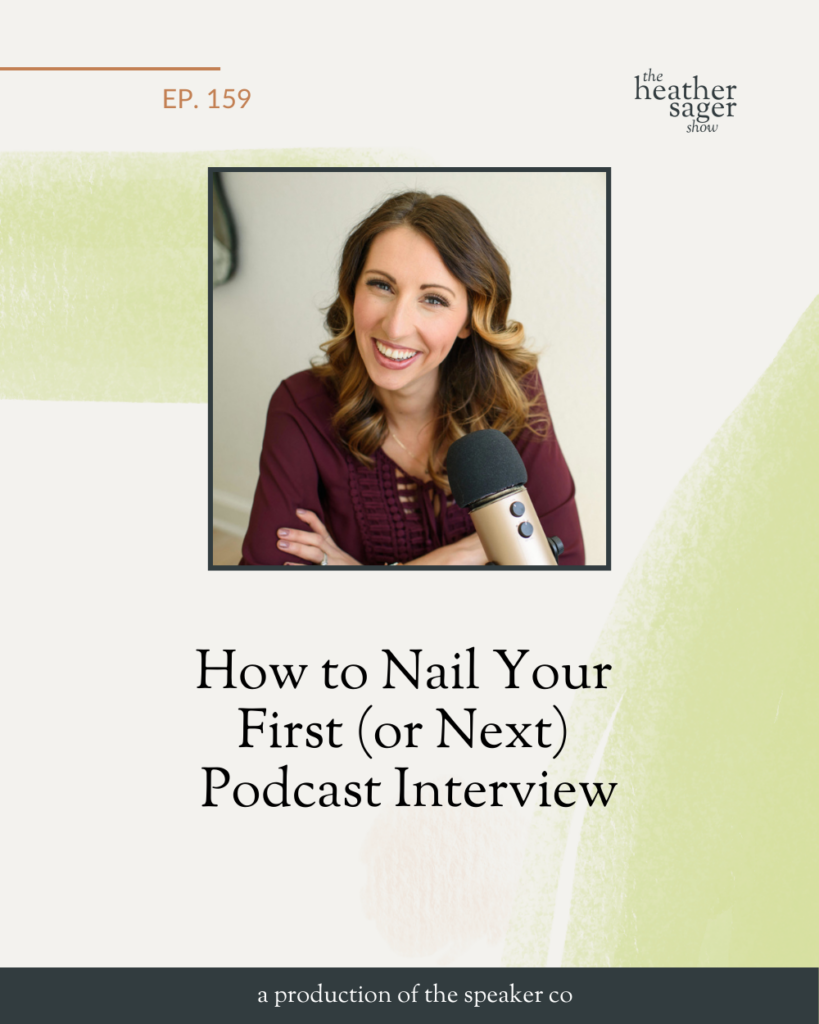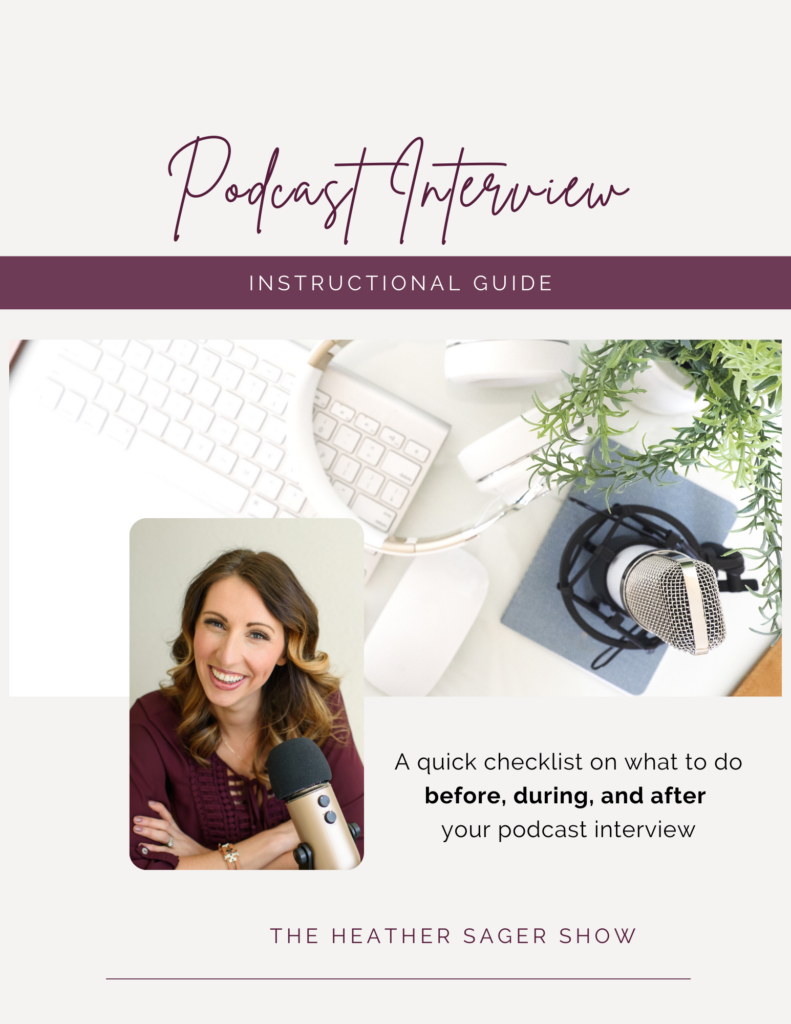
Subscribe to Heather's Youtube Channel here.
LISTEN TO THIS EPISODE ON APPLE PODCASTS / SPOTIFY / STITCHER
Wooooo! You landed a podcast interview—congratulations! Whether this is your first podcast appearance or your 20th, you’re probably wondering what you can do to maximize your ‘onstage’ moment and ensure you sound good in the interview!
Or maybe you’re seriously freaking out with nerves wondering how you can gracefully cancel ← that’s totally normal if this is your first time, but don’t you dare decline that invite because I’ve got you covered!
Get ready for this masterclass of an episode!
I’m sharing EXACTLY what to do before, during, and after every podcast interview to fully leverage this opportunity for your business (or at least calm your nerves so you can show up and deliver mildly coherent sentences)
GRAB THE FREE PODCAST PREP GUIDE
This episode is so value packed, but don’t worry about taking notes, we created a PDF resource so you have a checklist to use to rock every podcast episode from here on out.

Episode Takeaways and Key Highlights:
- The value of being on podcast + why it’s a powerful tool for visibility in your business
- What to do ‘before’, ‘during’ and ‘after’ the interview
- How to be a knockout podcast guest and get the most out of your podcast opportunity
- Creating your speaking bio
- Plus PRO tips to ensure you’re not freaking out during the interview
Episode Show Notes
The Value of Being on Podcast
We all know that podcasting is an exceptional way to get your message in front of more people.
It’s an incredible way to share your message and your story, connect with more people whether that’s your ideal customer, ideal client, ideal audience you want to work with or even just on a broader scale of practicing getting in front of people.
Here’s some great things about podcasting that I love the most:
→ It’s more of a long form content.
Let me tell you why this is important.
Podcast as a long form content provides more space to share valuable information to your audience while amplifying your brand’s unique voice.
In a world where our brains are being retrained to consume information in tiny tidbits, it’s hard to not just capture the message but get your personality and connect with your people in these really short form bites.
→ It removes the biggest barrier entrepreneurs have when it comes to sharing their message.
Showing up live or even speaking on stages is a great way for you to build your brand. It shows your credibility and your authority while educating and giving people a taste of what they could get if they work with you. But the thing is sometimes stages and getting on video a lot of times, freak people out.
That’s why I love podcasting so much because it removes one of the biggest barriers that I see entrepreneurs have when it comes to sharing their message, which is that video can be intimidating. Remember that you do not have to be on video for you to be more visible in your business.
→ You can listen to podcasts while doing other things.
One of the reasons I love audio so much, whether it’s audiobooks or audio podcasts, is it’s wonderful because you can do something at the same time whether that’s driving, or walking, or doing the dishes, or cooking. You don’t have to be so super focused on consuming everything to get the value of the message.
Now, how does this relate to you?
When you become a guest on other people’s podcasts, what that means is your words, your answers, your stories, your message becomes that audio track for people whatever they’re doing—you become that audio track.
3 main areas to look at to get you started when you booked a podcast interview (so you’re not wasting your time or missing out on opportunities)
If you’re speaking on a podcast stage that is an opportunity for you to propel your business forward.
Remember, you are the voice of your brand. You want to make sure that you sound good so let’s make sure that you are leveraging it to your best ability.
→ Let’s begin with ‘BEFORE’ the interview.
I wanted to share a few best practices to make your podcasting life easier to help you prepare even before the interview.
1. Make sure you have a speaking bio.
You definitely need to ensure that you have a speaking bio, a little about me paragraph. And If you find it hard to write one, go to your favorite person’s website and look on their speaking page and see how they write their bio.
PRO TIP:
Create yourself a ‘Media’ folder on your Google Drive or on your desktop or on your Dropbox (whatever you use). Make it easy for you to find this for the future so that you don’t have that lame excuse of, ‘I don’t have those things, I can’t apply for the speaking gig.’ Yes, you can! Do it one time and be done with it plus it saves you time.
2. Create your talking points.
There needs to be some kind of topic whether that comes from the host or that comes from you.
When you book the interview, you should have a conversation with the host or there should have been some kind of back and forth around what you want to talk about.
If you haven’t gotten it from the host, take initiative and choose what’s the topic then run that by the host. Don’t worry about perfect messaging for this. What we just want to do is get into practice and be intentional. They don’t have to be super detailed and just jot down three to five bullet points for yourself. It’s just going to be prompts for you so that you feel confident of showing up as someone who’s intentional versus of you going like a deer in headlights then you’re thinking on your feet.
PRO TIP:
Step back for a second and think of somebody who’s new to your topic. Take note of what they would need to know and want to know, what are the frequently asked questions, tips you can give them or places they get tripped up—these can be your talking points.
3. Know your Call to Action (CTA) and practice it.
Get really clear on your CTA. You have to be fluent in the words that fall out of your mouth so you do not sound awkward and know exactly what you’re talking about. You need to give them a reason to go get your free guide.
Remember that it doesn’t matter how good you are in the interview, if you do not know how to seamlessly convert people onto your email list, what the heck is all of this visibility work for? (Want to ATTRACT leads from podcasts — grab this free cheatsheet: 19 Simple Phrases that Convert: Using these words in your next talk will be the difference between you getting praise for sharing your expertise versus getting LEADS for it.)
4. Clean up your social media profiles.
Before you go live on that interview, I want you to clean up your social media profile whatever your main one is so you don’t create confusion to your ideal audience.
Your bio, your photo and all those things should all be updated and current. So when somebody hears you talking about something on a podcast or somebody shares your content, if they go look at your profile right now, they want to stay. (Listen to THSS Ep #64 and learn the fours specific things to you can dow now to prepare for pitching)
PRO TIP:
Optimize your social media around the time the podcast episode is airing to be really on par.
→ Now let’s move into ’DURING’ the podcast interview.
Now that we have our assets together and have really thought through our call to actions plus made sure that our social media profiles are all current and updated, what we’re going to tackle next is get to the interview itself. We want to make sure that you sound confident and competent.
So here are few pro tips that you can do to make sure that you’re not freaking out during the interview:
- Focus on one CTA only.
- Make it about the audience—show up and serve.
- Be concise and limit your filler words.
- Bring in your personality.
→ Lastly, let’s talk about ‘AFTER’ the podcast interview.
I want you to focus on two things post-podcast interview:
1. Be a gracious guest.
You can send an email to the host after, thanking them. When your episode goes live, thank them again. Thank them for their time. Don’t be annoying but be genuinely grateful and gracious for them to open up their platform for you.
2. Promote and share the episode.
When your episode goes live, share it. This is for two specific reasons. One, the host gave you this shot so it will be nice to promote it to your people and help spread the word. This could also turn into more opportunities.
The other reason is It is a credibility and authority amplifier. You want to show your audience that you’re the kind of person people trust to put on a podcast. That’s where the juice comes in.
Don’t forget that it’s not just an opportunity for you to get in front of their audience but you are also showing your audience that you are a bookable podcast guest and you most likely can book more podcast episodes just by showcasing that.
Previous Episodes Mentioned:
How to Make Showing Up for Your Brand More Fun – Ep #156
How to Cut the Filler Words and Embrace the Silence – Ep #18